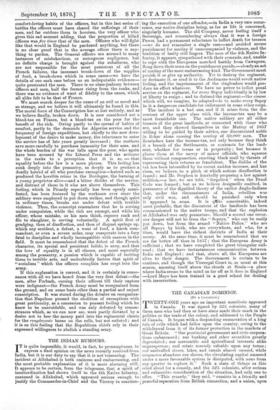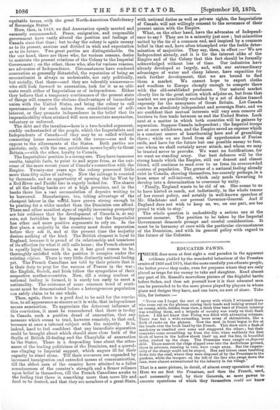THE CANADIAN DOMINION. [Br s CANADIAN.] T WENTY-ONE years ago an
important manifesto appeared in Canada. It was signed by 325 colonists, many of them men who had then or have since made their mark in the politics or the trade of the colony, and addressed to the People of Canada. It began with a desponding enumeration of a long tale of evils which had fallen upon the country, owing to the withdrawal from it of its former protection in the markets of Great Britain. " Our provincial government and civic corpora- tions embarrassed ; our banking and other securities greatly depreciated ; our mercantile and agricultural interests alike unprosperous ; real estate scarcely saleable upon any terms ; our unrivalled rivers, lakes, and canals almost unused, while commerce abandons our shores, the circulating capital amassed under a more favourable system is dissipated, with none from any quarter to replace it." Such a state of things ae this cried aloud for a remedy, and the 325 colonists, after serious and exhaustive consideration of the situation, had only one to offer. " This remedy," they said, " consists in a friendly and peaceful separation from British connection, and a union, upon
equitable terms, with the great North-American Confederacy of Sovereign States." Here, then, in 1849, we find Annexation openly mooted and earnestly recommended. Peace, emigration, and responsible government have vastly altered the position and feelings of Canada since that time ; but to-day the colony is again uneasy as to its present, anxious and divided in wish and expectation as to its future. Two great parties are distinguishable. On the one hand, there are those who, for various reasons, desire to maintain the present relations of the Colony to the Imperial Government ; on the other, those who, also for various reasons, are advocates of Independence. Circumstances have rendered annexation so generally distasteful, the reputation of being an annexationist is always so undesirable, not only politically, but socially, that those—and they are tolerably numerous— who still look forward to annexation, look for it as an ulti- mate result either of Imperialism or of independence. Either they believe that a temporary continuance of the present state of things will remove the obvious disadvantages of immediate union with the United States, and bring the colony to call spontaneously for such union from considerations of self- interest, or they promote independence in the belief that its impracticability when attained will soon necessitate annexation, voluntary or enforced.
The debt and the taxation—here is a two-headed argument, readily understanded of the people, which the Imperialists and Independents of Canada—if they may be so called without connecting home associations with the terms—can and do oppose to the allurements of the States. Both parties are patriotic, only, with the one, patriotism means loyalty to Great Britain,—with the other, loyalty to Canada.
The Imperialists' position is a strong one. They have immense results, tangible facts, to point to and argue from, as the out- come of the more recent years of Canada's connection with the Empire. Twenty-one years ago the colony possessed little more than fifty miles of railway. Now the mileage is counted by thousands, and an opportunity of opening the far West by a Red River and Pacific line is eagerly looked for. The shares of all the leading banks are at a high premium, and in the banks there lies a vast accumulation of deposits waiting to be borrowed. Manufactures, too, taking advantage of the cheapest labour in the w&-ld, have grown strong enough to be panting for a wider market than the Dominion can afford. These and other manifest signs of rapidly increasing prosperity are fair evidence that the development of Canada is, at any rate, not forbidden by her dependence ; but the Imperialist has other and more positive arguments to rely on. In the first place, a majority in the country must desire separation before they ask it, and at the present time the majority desires nothing of the kind. The British element is loyal to England, because it is proud of its relationship and tenacious of its affection for what it still calls home ; the French element is equally loyal, because it is, as it has good reason to be, thoroughly satisfied with the position it occupies under the existing regime. There is very little distinctly national feeling yet. The French Canadians are told by their priests that it is their duty to pray for the success of France in the war ; the English, Scotch, and Irish follow the sympathies of their respective mother-countries. Now, till a strong nucleus of national feeling is formed, it is surely too early to erect a nationality. The existence of some common bond of senti- ment must be demonstrated before a heterogeneous population can safely claim to be one whole.
Then, again, there is a good deal to be said for the convic- tion, to all appearance as sincere as it is wide, that independence means annexation. To appreciate the deterrent influence of this conviction, it must be remembered that there is to-day in Canada such a positive dread of annexation, that any measure which seems to tend, however remotely, to that end, becomes at once a tabooed subject with the majority. It is, indeed, hard to feel confident that any immediate separation could be brought about which should steer clear both of the Scylla of British ill-feeling and the Charybdis of annexation to the States. There is a desponding tone about the utter- ances of the leading politicians of the Dominion, and a querul- ous clinging to Imperial support, which augurs ill for their capacity to stand alone. Till their resources are expanded by increased immigration and extended means of communication, till the ablest men of the country have attained to a fuller consciousness of the country's strength and a firmer reliance upon belief in themselves, till the French Canadians awake to the feeling that there is something more than mere life and food to be desired, and that they are members of a great State,
with national duties as well as private rights, the Imperialists of Canada will not willingly consent to the severance of their present union with the Empire. What, on the other hand, have the advocates of Independ- ence to say ? They are in a minority just now ; but minorities united by the tie of a common end, and inspired by a common belief in that end, have often triumphed over the feeble deter- mination of majorities. They say, then, in effect We are Independent already, and it is for the interest alike of the Empire and of the Colony that this fact should be formally acknowledged without loss of time. Our industries have already developed so largely, and, with our extraordinary advantages of water and cheap labour, have capacities for such further development, that we are bound to find them a market. We cannot hope to export cloths and woollens to Europe cheaply enough to compete there with the old-established producers. Our natural market clearly lies in the great nation which adjoins us, but from that market we are practically excluded by a set of duties framed expressly for the annoyance of Great Britain. Let Canada once be an absolutely independent and sovereign State, and we are confident that mutual interests will very soon remove all barriers to free trade between us and the United States. Look next at a matter in which both countries will be gainers by separation. Suppose Canada independent ; the Imperial troops are at once withdrawn, and the Empire saved an expense which is a constant source of heartburning here and of grumbling there ; while we are freed from all apprehension of Fenian raids, and have for the future but one possible enemy to fear, one whom we shall certainly never attack, and whom we may be trusted never to provoke. We want no fortifications, for we want no standing army. Our beat defences will be the strong hands which the Empire, still our dearest and closest friend, will continue to send over to us from its overcrowded centres of population. The germs of a national feeling already exist in Canada, showing themselves, too coarsely perhaps, in a keen sense of self-interest, which only needs thwarting to develop into a determination to overcome by unity.
Finally, England wants to be rid of us. She seems to us to have hinted as much, not indistinctly, in the whole tenour of her recent policy, and notably in well-known speeches of Mr. Gladstone and our present Governor-General. And if England does not wish to keep us, we, on our part, are too proud to wish to stay.' The whole question is undoubtedly a serious one at the present moment. The position to be taken by the Imperial Government demands prompt and careful consideration. It must be in harmony at once with the particular circumstances of the Dominion, and with its general policy with regard to the future of the Colonies.































 Previous page
Previous page